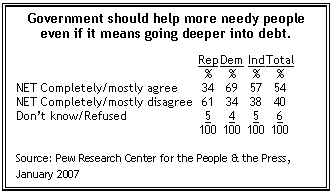by Richard C. Auxier, Pew Research Center
In a debate dedicated to the economy, former Tennessee Sen. Fred Thompson, making his first appearance on a debate stage with his rivals for the Republican nomination, stuck to very traditional — and very popular — positions among Republican voters.
Debt & Social Security
Thompson received the first question of the debate, and was asked about the outlook for the economy. While saying the short-term economic picture was “rosy,” he warned of future problems ahead, and the need to control government spending.
“We are spending money we don’t have,” said Thompson, who singled out “mandatory spending” (i.e. spending on Social Security and other entitlement programs) as “the fundamental and foremost challenge, I think, facing our country economically.”

When asked in a January Pew survey whether the government should help more needy people even if it means going deeper in debt, 61% of Republicans mostly disagreed or completely disagreed. This is at odds with the majority of Democrats (69%) and independents (57%) who completely agreed or mostly agreed that the government should help more needy people even if it means going deeper in debt. The country supports helping the needy even if it means more debt by a 54-40% margin.
While Social Security remains popular (nearly eight-in-ten — 79% — of Americans rated its impact on the nation as good in a March 2005 Pew survey), the issue has faded as a concern in recent years. Whereas the public named the program as one of their three top concerns in 2001, shortly before the 9/11 attacks, only 2% of Democrats and 1% of Republicans mentioned Social Security as the most important issue affecting their vote in the coming presidential primaries, according to an April Pew survey.
Trade

Thompson was also a staunch defender of trade. “Free and fair trade has been good for America, responsible for millions of jobs in this country,” said Thompson. “We cannot turn our back on that.”
According to a December 2006 Pew survey, Thompson is joined by pluralities of Republicans (50%), Democrats (42%) and independents (47%) in his belief that, in general, free trade agreements have been a good thing for the United States. On specifics, however, there is considerably less support.
Thompson stated that free trade has made the U.S. the “most prosperous nation in the history of the world.” While a plurality of Republicans (34-29%) agrees that free trade agreements make the American economy grow, the general public, by a 34-28% margin, disagrees. Support for the belief that free trade leads to more jobs is weaker still Overall, the country believes free trade leads to job losses rather than creating jobs by a margin of 48-12%, including pluralities of Republicans (42%), and majorities of Democrats and independents (51% respectively).
Regulation & Small Government
Throughout the debate, Thompson mentioned the need to restrain government regulation of business, raising the topic repeatedly in responding to questions about spurring economic growth and assisting manufacturing companies. Thompson’s response is very popular among all voters. Indeed, similar majorities of Republicans (57%), Democrats (57%) and independents (59%) completely agree or mostly agree that government regulation of business usually does more harm than good.
In a statement about economic growth, Thompson listed low taxes, less regulation, sound fiscal policies, and less spending as necessities. His support of smaller government is a popular Republican position, with 68% preferring a smaller government with fewer services to 26% preferring a bigger government with more services, according to a January Pew survey. The country at large is divided on the question, preferring smaller government by a 45-43% margin.
Iraq
Asked if the Bush policy in Iraq has been a good one, Thompson, in his first opportunity to address the war, stood with the president and the party rank and file. “I think the policy that we’re engaged in now is the right one,” said Thompson. In a September Pew survey, 68% of Republicans said the military effort in Iraq is going very well or fairly well. The public as a whole is far less positive in their assessment, with only 41% saying the military effort is going very well or fairly well, including 21% of Democrats and 38% of independents.

Thompson defended the decision to go to war with Iraq, saying that “in my own estimation, there’s no question that if left to his own devices, he and his son would still be running that place, attacking their neighbors and murdering their own people and developing a nuclear capability…”
Republicans strongly believe using military force against Iraq was the right decision, by a margin of 77-18%. That opinion is in sharp contrast to Democrats (21-73%) and independents (36-56%) who believe it was the wrong decision. Overall the public also believes it was the wrong decision, by a margin of 50-42%.
Pointing to signs of progress, Thompson also emphasized the need to stabilize Iraq, and not “leave with our tail between our legs.” In the September Pew survey, 69% of Republicans stated we should keep troops in Iraq until the situation has stabilized. Democrats (73%) and independents (60%) say we should bring troops home as soon as possible. The country as a whole favors bringing troops home over keeping troops in Iraq until the situation is stable by a margin of 54-39%.




